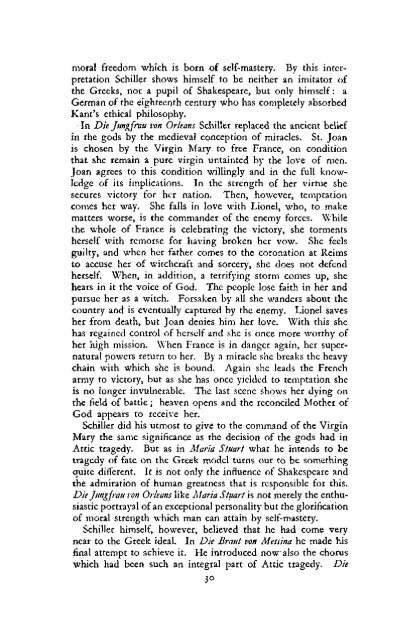Theoria - DISA
Theoria - DISA
Theoria - DISA
Create successful ePaper yourself
Turn your PDF publications into a flip-book with our unique Google optimized e-Paper software.
moral freedom which is born of self-mastery. By this interpretation<br />
Schiller shows himself to be neither an imitator of<br />
the Greeks, nor a pupil of Shakespeare, but only himself: a<br />
German of the eighteenth century who has completely absorbed<br />
Kant's ethical philosophy.<br />
In Die Jungfrau von Orleans Schiller replaced the ancient belief<br />
in the gods by the medieval conception of miracles. St. Joan<br />
is chosen by the Virgin Mary to free France, on condition<br />
that she remain a pure virgin untainted by the love of men.<br />
Joan agrees to this condition willingly and in the full knowledge<br />
of its implications. In the strength of her virtue she<br />
secures victory for her nation. Then, however, temptation<br />
comes her way. She falls in love with Lionel, who, to make<br />
matters worse, is the commander of the enemy forces. While<br />
the whole of France is celebrating the victory, she torments<br />
herself with remorse for having broken her vow. She feels<br />
guilty, and when her father comes to the coronation at Reims<br />
to accuse her of witchcraft and sorcery, she does not defend<br />
herself. When, in addition, a terrifying storm comes up, she<br />
hears in it the voice of God. The people lose faith in her and<br />
pursue her as a witch. Forsaken by all she wanders about the<br />
country and is eventually captured by the enemy. Lionel saves<br />
her from death, but Joan denies him her love. With this she<br />
has regained control of herself and she is once more worthy of<br />
her high mission. When France is in danger again, her supernatural<br />
powers return to her. By a miracle she breaks the heavy<br />
chain with which she is bound. Again she leads the French<br />
army to victory, but as she has once yielded to temptation she<br />
is no longer invulnerable. The last scene shows her dying on<br />
the field of battle; heaven opens and the reconciled Mother of<br />
God appears to receive her.<br />
Schiller did his utmost to give to the command of the Virgin<br />
Mary the same significance as the decision of the gods had in<br />
Attic tragedy. But as in Maria Stuart what he intends to be<br />
tragedy of fate on the Greek model turns out to be something<br />
quite different. It is not only the influence of Shakespeare and<br />
the admiration of human greatness that is responsible for this.<br />
Die Jungfrau ton Orleans like Maria Stuart is not merely the enthusiastic<br />
portrayal of an exceptional personality but the glorification<br />
of moral strength which man can attain by self-mastery.<br />
Schiller himself, however, believed that he had come very<br />
near to the Greek ideal. In Die Braut von Messina he made his<br />
final attempt to achieve it. He introduced now also the chorus<br />
which had been such an integral part of Attic tragedy. Die<br />
3°
















